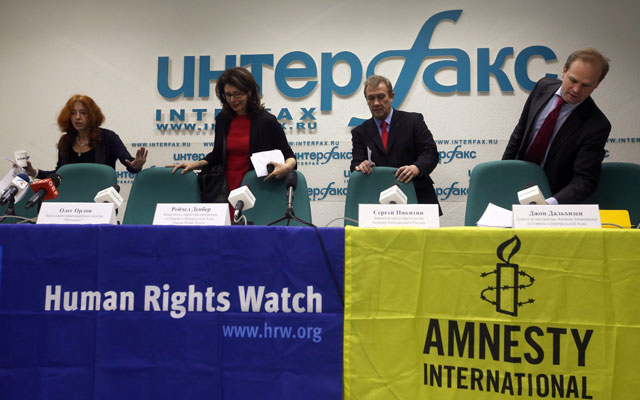Human Rights Watch (HRW) recently released a scathing new report focused on the crackdown on Russia’s civil society. Since December 2011, the Kremlin has committed to squashing nongovernmental organizations (NGOs) that promote democracy and are alleged conduits of Western influence, HRW says.
The report, titled “Laws of Attrition,” focuses on the repressive laws passed since May last year, which erode human rights and democracy in Russia. The document says that the Kremlin aims to sever Russia’s civil society ties with Western donors by requiring, among other things, the Western-supported NGOs to register as “foreign agents,” conducting searches and audits and abusing legal tools against them.
The report is an in-depth analysis of the “foreign agents” law and the subsequent crackdown on NGOs, the new law expanding definitions of state treason, the adoption ban aimed at U.S. adoption of Russian orphans, restrictions on public assemblies, and the beginnings of Internet censorship.
This is no more than a modern day witch hunt—handing down deathly labels to political opponents, which harkens back to Stalin’s show trials. These definitions were broadened to include a wide range of assistance to “a foreign state, an international or foreign organization, or their representatives in activities against the security of the Russian Federation.” Thus, for example, any contact with a foreign company or organization may be termed treasonous by the Russian government.
The state media has also attempted to smear live political opponents and dead whistleblowers—for example, Alexei Navalny and Sergei Magnitsky—by painting them as tools of the nefarious West.
Other measures have roots in age-old xenophobia and spy scare. The Kremlin’s internal narrative today is that the Obama Administration is responsible for the “Arab Spring” and is committed to using soft power tools, such as Twitter and Facebook, as well as NGOs and political opposition, to topple Russian President Vladimir Putin.
Russia’s human rights crackdown also reflects the new foreign policy doctrine, aimed to maintain Russia’s “great power” status and protect the current power structure at all costs.
On November 1, 2012, the Kremlin-controlled Duma has adopted new legislation that allowed the state to censor the Internet. Substantive website removal is focused on sites or videos that promoted suicide—no harm there. But the state also targeted a humorous encyclopedia and other inoccuous sites. It may only be a matter of time until the censorship is used for political ends online, as it is already used on TV.
The HRW report recommends that the Russian government repeal the oppressive laws. They clearly violate Russia’s constitution and international obligations to the 1975 Helsinki Accords and the European Convention on Human Rights.
Human liberties in Russia have become a victim of political machinations that started with the electoral fraud during the 2011 Duma elections and subsequent protests. The Kremlin is treating foreign-supported NGOs and democratic opposition leaders—and even innocent orphans—as hostages.
So far, Congress has expressed its concern, while the Obama Administration has presented half-measures, such as the very short and anemic Magnitsky List.
Given the Administration’s commitment to improving relations with Moscow to get cooperation on the Tsarnaev brothers, arms control, Syria, and Iran, the U.S. policy is unlikely to change dramatically any time soon.































